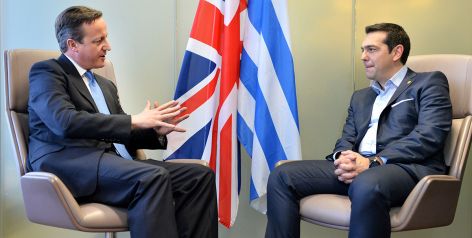Eurozone: Doomed to Political Integration?
A recent study indicates serious problems within the European Union. With talk of a possible Greek and British exit, is the EU coming apart?
British Prime Minister David Cameron meets with Greek Prime Minister Alexis Tsipras at the European Council on Feb. 12, 2015. 
The results of a recent study published by the Telegraph on Monday, June 22, 2015, indicate the European Union in its present form is doomed whether or not Greece leaves.
EU nations diverging, not converging
Consultants from the prestigious ECU Group, researching “Britain’s European Union membership and future prospects,” find that member nations are currently growing farther apart. The idea that inspired the EU was the opposite—that the nations of Europe would gradually grow closer together through union.
The fear in Europe is that a Greek departure might signal the eventual unraveling of the whole European project.
The article says: “New research demonstrates that members of the single European currency are becoming more economically divergent, making a single rate of interest increasingly unsuitable for the bloc.
“Political, social and cultural differences will also make it increasingly hard for the euro members to share a currency. Eventually, the Eurozone will have to either ‘integrate or disintegrate’, the analysis says.”
The study compares a number of variables among EU countries, variables that point toward growing difficulty in maintaining the union as it is today. For example, the continuing, even growing gap in economic performance will make it increasingly difficult to maintain a single interest rate for all member states.
There is also wide variance in behavior and social policies. Savings rates are lower in Portugal and Greece, compared to Finland and the Netherlands. “Finland, Austria and Germany all show significantly higher scores for educational attainment and research and development expenditure as a percentage of GDP than countries such as Italy, Spain, Portugal and Greece.”
There are also significant differences in “levels of corruption and the quality of domestic regulation” between the northern European countries and those in the south.
The study concludes that “the Eurozone will still face deep-seated problems that must be resolved by either breaking up or full-blown political integration.”
In other words, in order to survive, the European Union must transform into a single political entity.
Stronger leadership needed?
In another interesting twist, EUobserver.com reports that Hungarian Prime Minister Viktor Orban has gone on record stating “only ‘strong’ leaders, not institutions, can create stability in Europe.”
Discussing current challenges in Europe, Mr. Orban goes on to espouse the need for “strong leadership, even a personal one, and this leadership should be stable. Stability of leadership is the key to financial stability in Europe in future.” He is maintaining, in effect, that to have financial stability, there must be strong, personal and long-term leadership, apparently by a very few or perhaps even one person.
In its current configuration, the EU is mostly run by anonymous technocrats and generally devoid of personal charismatic leadership. This is a reaction to the cataclysm of World War II, which was largely brought about by the cult of personality in parts of Europe and Asia during the 1930s and 1940s.
Prophetic implications
At the moment, most leaders in the European Union would strenuously disagree both with the findings of the ECU Group consultants and Mr. Orban, but time will tell if they are correct.
It is important to note that both predictions concur with a key prophecy in the Bible.
Immediately before the return of Jesus Christ, there will be a final revival of the Holy Roman Empire composed of 10 polities based in Europe. The leaders of these 10 nations, or groups of nations, will submit their authority to an autocrat, called the beast. These will all fight against Christ at His return.
An angel explained a vision about these leaders to the apostle John: “The ten horns which you saw are ten kings who have received no kingdom as yet, but they receive authority for one hour as kings with the beast. These are of one mind, and they will give their power and authority to the beast. These will make war with the Lamb, and the Lamb will overcome them, for He is Lord of lords and King of kings” (Revelation 17:12-14).
For this prophecy to come to pass, there must be complete political and military integration in parts of Europe. At some point, this will likely become a necessity for European survival and security and will require a strong leader.
Developments in Europe require close attention as they unfold.
For further insight into the future of Europe, read the articles in the section on “Understanding the Mysterious Book of Revelation.”
Photo by The Prime Minister's Office/CC BY-NC-ND 2.0
Date Posted: June 23, 2015

 by Joel Meeker
by Joel Meeker

